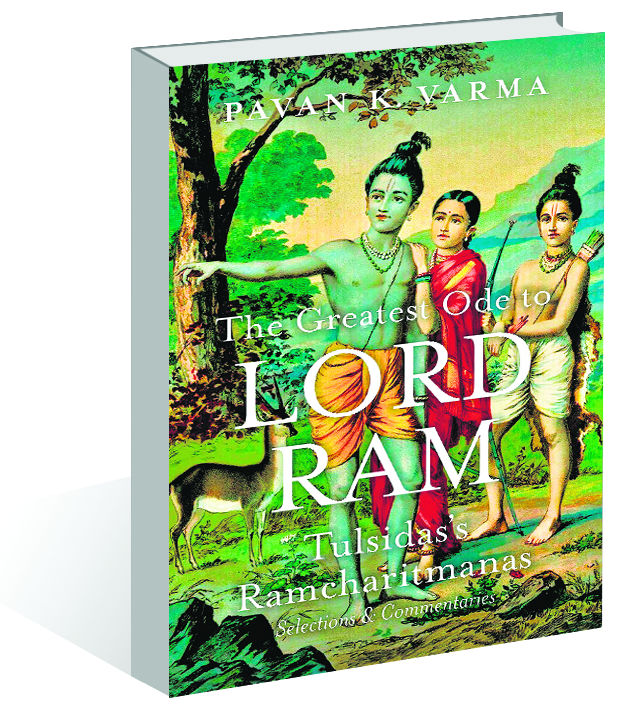
The Greatest Ode to Lord Ram: Tulsidas’s Ramcharitmanas by Pavan K Varma. Westland. Pages 362. Rs 699
Ram Varma
The enduring story of Prince Ram of Ayodhya, who is regarded and worshipped as God in India, was said to have been originally composed by sage Valmiki in Sanskrit. Valmiki was supposedly a contemporary of Ram in pre-historic times. He lived in an ashram on River Sarayu’s bank, some distance away to the east of Ayodhya. His poem had attained great popularity and was sung by wandering minstrels in royal courts. In my reckoning, it wasn’t a very long poem; it was probably capable of being recited in a couple of hours.

In the course of time, however, the poem began gathering mass. When some time in the 5th century BCE, Valmiki Ramayana was reduced to writing, it had become a voluminous tome. The pandits added two extra chapters, called Bala Kanda and Uttar Kanda, in the beginning and end of the main story; this transformed Ram as an avatar of the Vedic god Vishnu.
Being in Sanskrit, the book remained a preserve of the pandits for centuries. But in 16th century AD, saint-poet Tulsidas composed his Ramcharitmanas in Awadhi, a dialect of Hindi, democratising devotional literature, as the author aptly remarks in the book. Ramcharitmanas entered the common Hindu households in North India and became sacred reading, like the Bible in Christian homes.
Tulsidas ended Ramcharitmanas at Lord Ram’s coronation on his return to Ayodhya. He thereby obliterated from his retelling the tragic episode of Sita’s banishment in Valmiki Ramayana. It also helped him avoid another horrific episode about a Shudra boy Shambhuk. A Brahmin had appeared in Lord Ram’s court one day carrying the body of his child. He said that his child had died because a Shudra boy was practising austerities in the forest. Ram had gone in his search and beheaded the boy, Shambhuk.
A fundamental difference between Valmiki Ramayana and Ramcharitmanas is that, in the former, Ram does not know that he is an incarnation of Vishnu until he kills demon king Ravan. Only after the war is over the gods appear before him and tell him his real identity. On the other hand, in Ramcharitmanas Ram appears before his mother, Kaushalya, at the time of his birth in a miraculous four-armed form, bearing his characteristic emblems — a conch-shell, a discuss, a club and a lotus. Kaushalya is over awed. She prostrates before Him and requests to take a child’s form.
Tulsidas’ epic is also a veritable tome. It contains over 4,000 stanzas. Besides, it’s rambling and digressive. It begins with the narration of fanciful tales about Shiva-Parvati, Brahma, Sage Narada, Kakbhushundi, Garuda and many others, trying the readers’ patience. Even after the coronation of Ram has taken place after his 14-year exile, Tulsidas goes on and on, singing the glories of Ram-rajya and retelling sundry Puranic stories for about a hundred pages more!
Pavan Varma has devised an ingenious method of cutting through Tulsidas’ copiousness and immensity while retaining the integrity and flavour of the original. His fascinating production presents Ramcharitmanas in a nutshell, as it were. He has made intelligent selections from Ramcharitmanas which focus on the principal events of the story. He quotes these selected verses in original Awadhi and translates them in both Hindi and English. His delightful version enables you to finish the story in one sitting, if you like. It’s indeed a commendable job. The reader is offered the kernel of Ramcharitmanas in a capsule while preserving the grandeur of the original and the sweetness of Awadhi.
The selection of the episodes is superb. However, I missed the captivating episode of the Kewat (boatman) refusing to take Ram, Sita and Lakshman across the Sarayu in his boat. The Kewat tells Ram that by touching the dust of his feet a stone had turned into a woman (Ahalya) and he would be ruined if he allowed him to get into his boat, which was made of a softer material, wood, and was sure to turn into a woman. He lovingly washes Ram’s feet on this pretext, drinks the holy water and then takes them across.
The Shabari episode has been included in the selection. Tulsidas wrote it with great feeling. However, his bias against the Shudras in general is reflected in a dialogue between Vasishtha and Bharat. Vasishtha denigrates such Shudras thus: ‘(are) disrespectful towards the Brahmins, are loquacious and proud of their knowledge and love to be honoured.’
Tulsidas is also a bit of misogynist; his aversion to the fair sex is evident in another episode. When Ram and Lakshman are cooped up in a cave near Kishkindha in the rainy season, unable to proceed further in search of Sita due to rains, Ram describes the falling rain to Lakshman: Ghana ghamanda nabh garjat ghora. Priya heen darpat mana mora. (The roaming clouds are terribly thundering in the sky; Separated from my beloved, my heart trembles, I’m afraid). Tulsidas showers apt similes for each aspect of the rains. But in one simile, he betrays his misogyny and makes Ram tell Lakshman: Mahavrishti chali phoot kiyari, Jimi sutantra bhaye bigrahin naari. (The embankments of the fields have been breached by torrential rains just as women get spoiled by freedom). Elsewhere in Ramcharitmanas, he has famously opined: Dhol, ganwar, Shudra, pashu, naari, Yeh sab taran ke adhikari. (The drum, the illiterate bum, the Shudra, the animal and the woman — they all deserved to be rebuked or thrashed!).
But of course, I am being unduly critical of one of our greatest poets. Perhaps he can’t be blamed; he was only voicing the common sentiments of the age he was living in.
Pavan Varma has done a marvellous job in bringing out the essence of Tulsidas’s popular epic in this beautifully produced twin-language abridgement to attract modern readers.
Join Whatsapp Channel of The Tribune for latest updates.



























